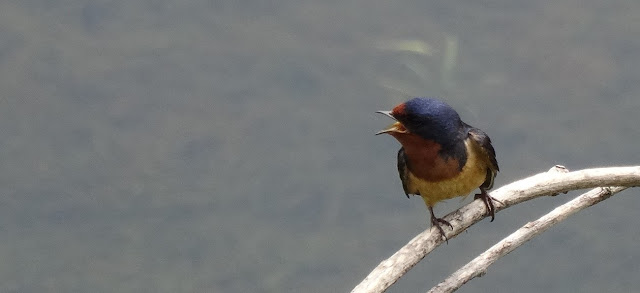9/20/2021
purple asters
9/18/2021
seed harvest
Birds are already pecking out the sunflower seeds (top) and goldenrod flowers are releasing each seed with pappus, a tuft of hair that helps it disperse in breezes (bottom).
9/12/2021
bee on asters
The asters are abuzz with pollinators. While standing among the wildflowers, I hear the buzzing as loud and pleasant. There are many Panicled Aster Symphyotrichum lanceolatum plants in the riparian area around the pond. The nectar and pollen of the flowerheads attract many kinds of insects, including honeybees, bumblebees, wasps, flies, butterflies, skippers, and beetles. I have not seen any Wild Turkey here, but they feed on the seeds and foliage of aster plants. Maybe some day . . .
9/06/2021
8/30/2021
mallard twins and lone goose
8/21/2021
blooming water plantain
8/19/2021
strong stem
Ironweed is one of a few host plants for American Painted Lady butterfly. ‘Host plants’ are those that the butterfly lives on, lays eggs on, and their larvae are sustained by.
See also the post on 8-21-2020
8/16/2021
blue lobelia
Blue Lobelia, a native perennial, started blooming several weeks ago in the wetland around the pond. Each spike of flowers opens from the bottom up. This plant Lobelia siphilitica is related to the intense red Cardinal Flower Lobelia siphilitica. In fact, sometimes Blue Lobelia is called Blue Cardinal Flower. It should bloom until frost, now that we received some rain after a dry summer.
8/14/2021
arrowhead blooming
Among the plants along the shore of the pond, Arrowhead Sagittaria latifolia plants hold their leaves pointing skyward above the water.
This week, we noticed they are blooming with white, 3-petaled flowers held up above the leaves on strong branched stems.
Each flower is about 1" across.
This variety is specifically Broadleaved Arrowhead; also called 'Duck Potato' since it is a perennial plant that forms food-storing tubers as roots.
8/13/2021
8/11/2021
small turtle, big turtle
hummingbird 2021
The twig hanging over the water is a favorite perch for birds.
This Ruby-throated Hummingbird sits on the twig to rest on her way to the Lonicera blooming nearby.
8/06/2021
bugs by the pond

8/02/2021
blue vervain
8/01/2021
monarch butterfly
7/31/2021
maltese cross
A volunteer plant in the area around the pond - - Maltese Cross.
7/28/2021
convivial ducks
This summer has been very scant on rainfall so far. The pond water level is currently low, and there is plenty of algae floating. But the rocks are always good places for sharing the sunshine. Female Mallard and Hooded Merganser have raised their young broods here, and shared the big rock today.
7/23/2021
mountain mint
7/20/2021
evening primrose
7/19/2021
7/17/2021
royal catchfly
Royal Catchfly Silene regia makes its bright red flowers stand out among the white and purple wildflowers now blooming.
This family of plants was named 'catchfly' because it has a sticky seed pod behind the flower. Little flies, gnats, and other tiny insects get stuck on the sticky pod or stem.
Butterflies also pollinate this wildflower.
7/15/2021
mulleins
7/11/2021
barn swallows
Barn Swallows hunt over the pond, where they catch flying insects mid-air. To do this efficiently, they fly with their wide beaks open.
This pair found a good amount of food here, and decided to make their nest nearby. They gathered mud from the shore to paste pieces of grasses to a vertical surface in a barn, outbuilding, or nearby structure.
When their eggs hatch, the pond area will be a resource for mosquitoes and other flying insects to feed to their chicks.
7/07/2021
white wildflowers
Sitting near the pond, one can gaze out at flowering plants among the green grasses, rushes, and reeds. Mountain Mint, Swamp Milkweed, and Queen Anne's Lace are among the ones blooming now.
7/04/2021
yellow loosestrife
Small yellow wildflowers, brightening the green grasses and rushes around the pond now, are River Loosestrife Lysimachia hybrida, or Lowland Yellow Loosestrife. This plant bloomed last year, and came back stronger with more stems this season. Lysmachias produce floral oil rather than nectar. These plants are also pollen hosts for Macropis bees; the bees specialize in using a mixture of pollen and floral oil to produce offspring. read more at U of MN Extension


































